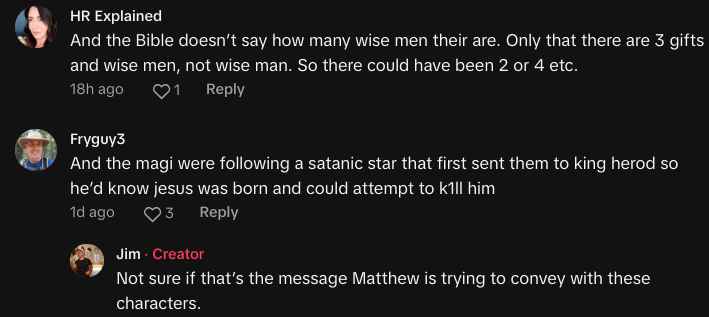TikTok Reverend Sparks Debate Over Nativity Accuracy and Tradition in Religion
"I’m fun at parties too!"
Published Nov. 20 2024, 2:00 a.m. ET
Reverend Jim (@revjimruns), known for his running content and "progressive/liberation theology," recently posted a video that caused mixed reactions on TikTok. In the clip, which captured a respectable 29K views, the foggy-glasses-wearing runner slowed his pace to deliver a quick theological critique of the nativity scene.
He pointed out a common inconsistency in how the Christmas story is traditionally depicted:
"Consider this your annual reminder that in the Bible, the Magi and the shepherds are not in the same story. Magi are in Matthew; shepherds are in Luke. And actually, the Magi show up like three years later. So, uh, what's up with that?"
The comment section was not totally in lock-step. One user took a lighthearted approach, writing, "We all know this. It’s OK. It’s fun," pointing to the idea that nativity scenes are more about tradition than accuracy.
Another commented, "Wait! I need to get my Bible!" while someone else poked fun at Jim’s analytical style, quipping, "I’m fun at parties too!" Others were more critical, with one user writing, "Accuracy isn’t one of religion’s strong suits."
This seemingly innocuous post opens a larger discussion about the intersection of tradition, accuracy, and how religion is understood and practiced in the modern era.
For many Christians, the Bible is less about strict historical accuracy and more about guiding moral principles. Nativity scenes, for instance, are cherished symbols of the season, blending elements of Matthew and Luke's accounts to create a cohesive and universal “story”.

This tradition, while not entirely scripturally accurate, serves as a reminder of the spiritual messages of hope, humility, and divine intervention.
It’s worth noting that the Bible was written in a time when storytelling and parable was a primary means of communication.
Scientific and historical disciplines were not as developed, and parables or symbolic narratives often took precedence over factual precision. For many believers, this lack of accuracy isn’t a stumbling block but rather a framework for understanding deeper truths.
However, as society becomes increasingly informed and critical, the gap between tradition and accuracy invites scrutiny, especially from those who approach religious texts from a progressive or analytical perspective.

Reverend Jim’s critique aligns with a broader trend in religious thought known as progressive theology, which emphasizes social justice and reinterpreting scripture through the lens of marginalized groups.
This approach often challenges traditional interpretations of the Bible, pushing for change within religious institutions.
At the same time, traditional Christianity faces significant challenges. Over the past few decades, revelations of abuse within the Catholic Church, coupled with the closure of churches across the United States, have eroded trust in organized religion.
Attendance at services has declined, and younger generations are increasingly identifying as nonreligious.
Despite these challenges, Christianity continues to play a significant role in American life. For many, the focus on tradition — rather than accuracy — provides continuity. Rituals like Christmas celebrations, even with their historical inconsistencies, connect individuals to a sense of community and meaning.

In recent years, Christianity has also been a significant force in politics. The 2016 and 2020 elections, for instance, displayed the influence of religious voters, with traditional Christians playing a pivotal role in Donald Trump’s victories.
As Fox News noted, "Bible-believing Christians" were considered key to his success. This raises an interesting question: Was it traditional Christians, progressive Christians, or a mix who helped shape these outcomes?
Progressive Christians often focus on issues like social justice and equality, sometimes aligning more closely with liberal politics. Traditional Christians, on the other hand, are more likely to adhere to conservative values, fighting for religious freedom and opposition to cultural shifts they see as undermining faith-based principles.

The divide between these groups reflects a larger cultural tension: how to reconcile the progressive push for societal change with the traditional values that many Christians hold close.
While debates like Reverend Jim’s may seem divisive, they hint at an essential truth about religion: It evolves. Whether progressive or traditional, Christianity — and faith in general — adapts to the times, drawing on ancient texts while finding relevance in modern life. The nativity scene may not be historically accurate, but it remains a beloved tradition that bridges the gap between theology and community, offering joy and nostalgia to millions every holiday season.
As Reverend Jim continues his running-and-reflecting series, his critiques beg the question: to question or to believe? Even when religious texts are subjected to scrutiny, their core messages of love, justice, and redemption continue to resonate.
